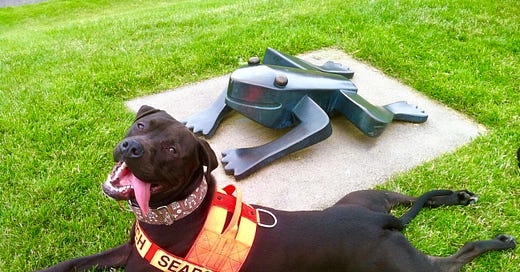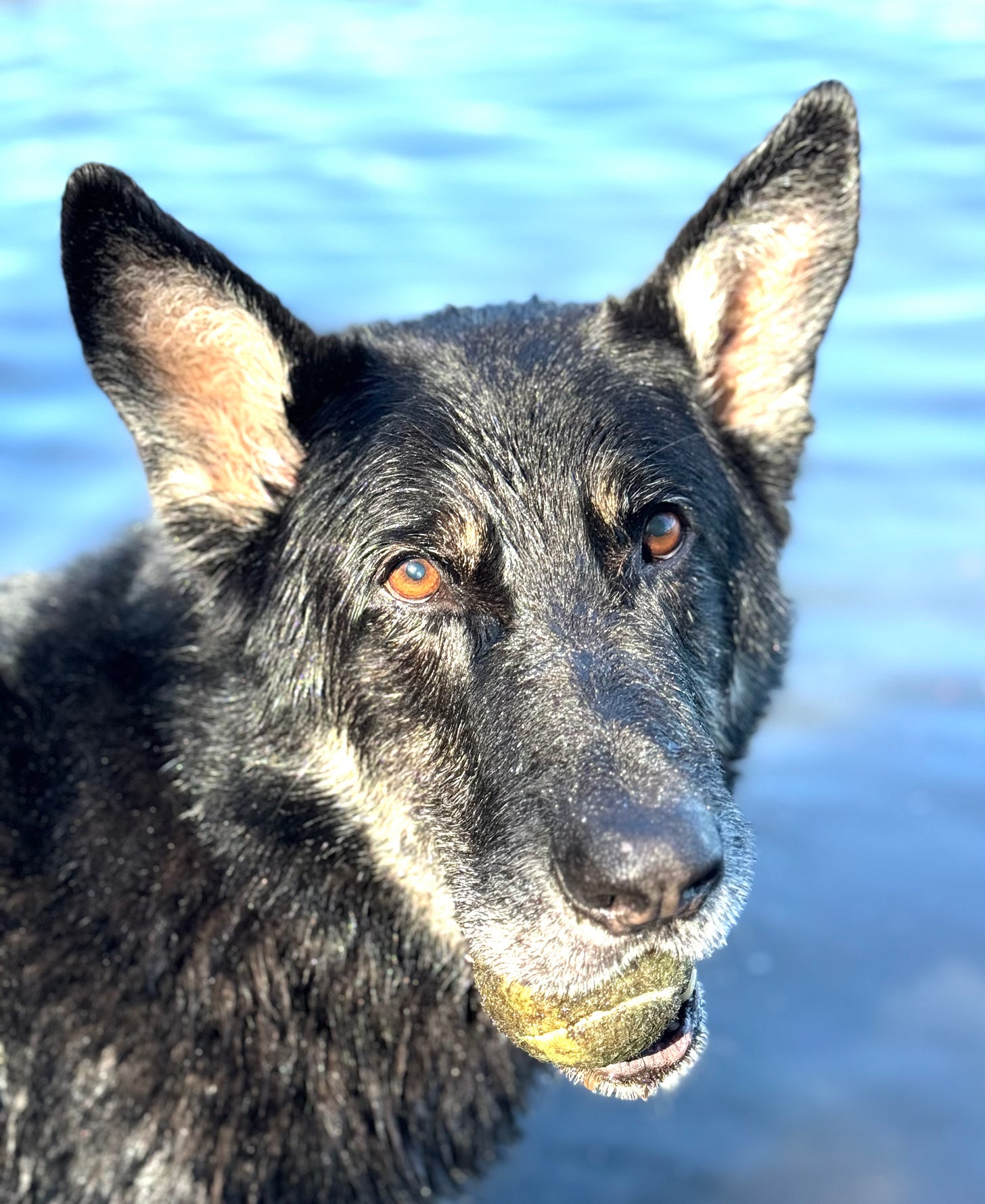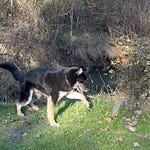I am suspicious of humans who seem generally happy, as if everything is going well in their lives. I think maybe they aren’t paying attention to the fact that the world is on fire. Do they not know that almost a million dogs and cats will be euthanized in shelters this year? I have not particularly sought out happiness as a goal. I am not opposed to happiness if it comes to me, and I find things that make me happy every day. Much of what makes me happy these days has come to me because of serendipity, and because I recognized the opportunity.
In particular, I notice small, exquisite things that are magical and wonderful. Just now, Valentino was resting beside me, and he gave out a small gesture, an exhalation with a slight whistle. Most people probably wouldn’t notice it. It’s hard to describe, but it is a specific sound he makes when he is very comfortable and content. I wish I had a recording of it. I love to hear him make that sound.
I was extremely happy today going to training. I had a car full of dogs, Tino, Mu, Fozzie, and Raven. Raven has been doing so well in her search training, and I am highly optimistic she will have a great search career. Fozzie had a couple of good years as a search dog, but is now happily retired. He was going with us to training to be the target dog. Mu has had a long career, over 11 years, and he has found hundreds of cats. He is not searching as much these days, because he gets tired, but he still likes to go to training. Tino doesn’t really need training in order to learn things, but more as a reward and to have fun. This happy car full of dogs, all were discarded by their previous owners. The best things in my life, the people who bring me the most happiness, were casually thrown away as worthless by someone who couldn’t see their value. I felt very fortunate to have them, to be driving to training with this car full of unwanted mutts who have been trained to do important work and save lives. Sunday has been the best day of the week for almost 16 years now, the day when all the dogs get to have fun. When my dogs are happy, I am happy. Sundays make me happy.
When I was growing up, I never said to myself that I hoped I would one day work with search dogs. I did not go to college for finding lost pets, although I wish I could have. For most of my life, I wasn’t even aware this was something people could do, finding lost pets with a search dog. That I do this work at all is a happy accident. I got Kelsy from a shelter because of Hurricane Katrina. It made me more aware of all the dogs in need, and if I couldn’t travel to New Orleans to help rescue dogs there, I could help out by rescuing a shelter dog locally. When I got puppy Kelsy, of course I loved her, but I didn’t know she would become my search dog and we would have a special bond. We might never have trained to find lost dogs except that I saw a flier on a kiosk at the off leash park. I wasn’t in the habit of checking the kiosk. What if I just walked by the flier? Or we came on a different day? That I have a career in finding lost pets, that I work with great dogs, is largely due to random chance. Also, we acted on that opportunity. I like those happinesses that were not sought, but seized when discovered.
Someone recently asked me what I like best about my job. I didn’t hesitate in answering that I like working with my dogs. They amplify my senses and open up a hidden world to me. I am augmented by my dogs. They allow me to do things i couldn’t do without them. Also, by giving them jobs, I give them fuller lives, where they can master a challenge. Later, I thought about my answer and I wondered if I should have answered that the best part of my job is when we find the lost pet, alive and well. Certainly some of my best memories are of when we found a dog or a cat, such as Charlie or Thelma or Cary or Mr. Kitty or Puppy or Scout. We don’t always find the lost dog or cat. It is a great feeling for me and for the dogs when we do find them alive and well.
Recently, we had two successful searches, one with a happy ending, and one not. Tino searched for an old black lab who had disappeared from the yard. He was 16 years old, 90 pounds, and he had trouble walking very far or fast. He lived next to a ravine. The backyards of the houses were at the top of a steep slope of trees and dense shrubs, and the creek was about 80 feet below. The owners wanted to find him fast. Tino started searching in the dog’s yard, and he followed the scent to a backyard about three houses east. Tino couldn’t pinpoint the lost dog in that yard, but the scent was strong in that area. Tino tracked a couple of houses further east, but the scent seemed to get weaker. We returned to the yard with the strongest scent. Tino kept looking down into the brush on the steep slope. I was ready to follow Tino down the slope if he pinpointed a scent trail, but the scent wasn’t taking him down a specific line. As we were there in that backyard, I thought I heard the sound of an old dog barking once or twice. It was faint. The dog’s owner thought she heard it, too. She directed her husband, who had gone around to a trail accessing the ravine, to the area where we thought we heard the bark. He found the old dog down in the creek. Apparently he had tumbled down the slope and fallen in the creek and couldn’t get himself out. He must have been in the creek for hours. The owners were very relieved to have found him. They took him to the vet. His body temperature was low, and he might have a cracked rib. If Tino had not pointed us in the right direction, the owners would have needed to search for their dog in all possible directions, on the streets and in the woods, and they may not have found him in time. I was very happy with Tino, for his excellent life-saving work, and we went to the lake and played, in celebration.
On another recent search, I used Raphael, the cat-detection dog, and Tino to find evidence of what happened to a lost cat. I started the search using Raphael, doing a grid search, looking for a hidden cat, or any signs of what might have happened to the cat. At several points, Raphael was just overcome with happiness, and he started zooming in little circles. When he does this, I let him do his little happy dance, and then I get him back to work. He really likes searching for lost cats. I remember Mu doing this a few times during his first year of searches. Raphael is a cat-detection dog who is supposed to work a grid, but sometimes he will hit on a direction and search along a line. I always have a GPS app running, so we can come back and fill in the blanks later. Raphael took me to a clump of fur about 400 feet west of the cat’s house. My first thought was that this fur was unrelated to the missing cat because it did not appear to be a visual match with pictures of the lost cat. We kept searching, and we worked our way back closer to the cat’s home. About midway between the clump of fur and the cat’s home, Raphael found the collar. It was a green collar, in the leafy debris and dirt. I would definitely never have seen it if I was just looking for it visually. The cat’s owner had walked right by that spot half a dozen times and not seen the collar. Only a search dog’s nose would ever have discovered this evidence. The collar was severed, as if by the teeth of a coyote. Also, the collar had a bell on it, which would have allowed a coyote to track the cat by sound. It was pretty clear to me what had happened. I praised Raphael for his excellent work, and gave him some cheese as a reward. To try to have more certainty, I put Raphi in the car and brought Tino out. Tino sniffed the collar, at the spot it was found, and took us in pretty much a straight line to the clump of fur that Raph had found earlier. We looked at some photos of the lost cat, and it turned out that she did have some fur that was a visual match, on her back legs where her fur was fluffier than the rest of her body. From that point, Tino took me between two fences, then dropped down a stone wall, went down a driveway, across a street, down a grassy right of way, to a greenbelt near the main street. At that point, he found coyote scat. It appeared to have the fur of the missing cat inside the coyote scat. This evidence was about 800 feet from the cat’s home. There would have been absolutely zero chance of this evidence being found without a search dog. I told Tino he was a good boy, and gave him some cheese as his reward.
As I had been working to try to find the lost cat with Raphael and later with Tino, I was doing everything I could to maximize our chances of success. The dogs do their thing, sniffing and evaluating, and it’s my job to manage them. I move them along when I see they are distracted by where a dog peed, or if a dog is barking at them. I keep them safe from cars and other threats. I watch their bodies and faces to see how they are responding, to try to interpret what they are smelling. Sometimes, with Tino, I just hang on and try not to fall on my face when he pulls hard on a strong scent trail. When I am working my dogs, we become one unit, a team, or perhaps a kind of symbiotic superorganism, a human-canine collaboration, almost as if our minds are linked. What we are doing is really amazing, in a lot of ways, and it would be impossible for either a human or a dog to do alone. Also, the hunting we are doing is similar to what dogs and humans have been doing together for thousands of years, but we are hunting lost pets instead of prey. I derive great satisfaction from both the act of searching and from the idea of using dogs--unwanted, discarded dogs--to find lost cats and dogs. Even though this particular search had a tragic outcome, according to the evidence we found, I was still very proud of my dogs’ work. The cat’s owner was also very happy with my dogs, even though it was bad news. She said she would rather know than always be wondering.
The happiness of success is different than the happiness of striving and searching. If it were possible, I would want to be successful on every search. Often, our ability to find the lost cat or dog can be limited by factors out of my control. The search dog can do everything right, and still not find the dog or cat. For example, if we hit private property and can’t continue the search, or if the cat or dog was picked up by someone and taken away in a car, then we can’t follow. Historically, my data shows that my search dogs have successfully found the cat or dog about 25% of the time. When we didn’t find the cat or dog, it wasn’t because we made a mistake or took the wrong approach, usually. We can do everything right and still not have that happy moment of finding the lost pet. When we work hard, searching in unison, I am happy even knowing that we will not pinpoint the lost cat or dog 75% of the time. We always have that 25% chance of success, and we may learn crucial things, like a direction of travel, even if we don’t locate a dog or cat.
I definitely want both types of happiness, when we are successful and when the dog and I are working as a team, in the groove, hot on the trail. The way we get to the happy-ending sort of happiness is by practicing and perfecting the art of the search, the striving without knowing if we will be ultimately successful. When we are working, in the groove, we enter a physiological state called flow. Mihaly Csikszentmihalyi wrote a book about this phenomenon. When someone gets into a groove doing work they are good at, that they find meaningful, a person can lose track of time and get lost in the work. This type of work is not a burden, even when it can be strenuous and difficult. I am often slogging through swamps, cutting through briar patches, and navigating down steep slopes of ravines. It can be challenging sometimes to keep up with a dog on the scent trail. I get focused on the pursuit, and I don’t mind being dragged around. Physiologically, this type of work can release neurotransmitters such as dopamine. My happiness of pursuit is at least partially chemical, as my brain and body give me happy molecules. It seems reasonable to assume that the search dog can enter a similar state of flow, since our physiology is so similar. The dogs definitely seem happy when they are working, regardless of the outcome. Raphael certainly appears to have an abundance of dopamine sometimes.
Kelsy, my first search dog, has been gone more than 7 years, and I think of her every day. I keep her in my thoughts intentionally, but I would think of her every day whether I wanted to or not. Of course I am a little sad at her passing, her physical absence, but she is never absent from my mind. When I think of the happiest times with Kelsy, I certainly remember specific successes, but I remember many more times when we worked hard and we never caught up to the dog. I was with her, working in the rain, in the dark, in a ravine, going places no one else would go. We were a team, becoming something greater together than either of us could be working alone. Today, I was specifically thinking that I was driving to Sunday training with my happy car full of happy dogs all because of Kelsy. She built everything in my life. My company, Three Retrievers Lot Pet Rescue, my nonprofit, Useless Bay Sanctuary, the Lost Dogs of King County Facebook group with 45,000 members, my books and my writing and my photography--everything stems from Kelsy and our work together. And all because we happened to go to the off-leash park one day and see a flier on the bulletin board.
I’m going to stick with my original answer about what I like best in my work: I like working with my dogs. When we don’t know if we will succeed, and we try our hardest anyway, we focus on being on the top of our game. It bonds me to my dogs. I love all dogs, no matter what, but the bond I have with search dogs I have worked with is on another level. I wish everyone could have this bond with their dogs like I have with my working dogs. With my current working dogs, I focus on the happiness of pursuit, of working together at our highest capacity, and we enjoy the happiness of a successful outcome if and when it comes. Success or failure doesn’t detract from our work. I will always aim for the happiness of doing the work, and of course we will take the best results, the happy endings, when they happen to come along.
The video below shows 11 years of working with search dogs, including Kelsy, Komu, Fozzie, Tino, Raphael, and Raven. Please share this newsletter with someone you know that likes dogs.









Share this post